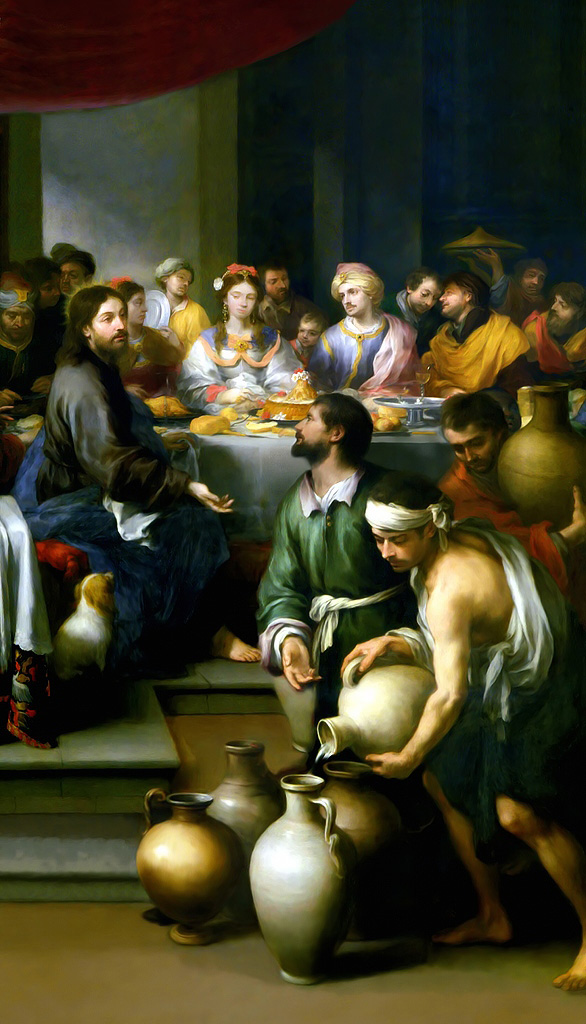This Tuesday, we are gathering to discuss the Wedding in Cana found in John 2:1-11. As we sing in the second half of verse 2 of our hymn: “and at Cana, wedding guest, in your Godhead manifest;/manifest in pow’r divine, changing water into wine.”
How to Read John:
For the Early Church, John was considered the spiritual gospel. John’s concern is not to relate those things that are seen with our physical eyes, but to share with us those things that are to be seen with our spiritual eyes. The other three gospels all read very similarly and are known as the Synoptic Gospels. Outside of the Baptism, the feeding of the multitudes, Palm Sunday, and the Passion/Resurrection, John has very little in common with the Synoptics.
John is intended to be read spiritually, not historically or literally. For example, in John 3 Jesus has his conversation with the Pharisee Nicodemus. Jesus tells Nicodemus that “unless one is born anew (or again) that he cannot see the kingdom of God.” v.3. Nicodemus responds: “How can a man be born when he is old? Can he enter a second time into his mother’s womb and be born.” v.4. Jesus is speaking spiritual, whereas Nicodemus is understanding only physically and literally.
The Passover in John:
In the Synoptics, Jesus eats the Passover meal with his disciples, i.e. the Last Supper. It is here where Jesus institutes the Eucharist through the breaking and distributing of the bread, and the blessing and sharing of the wine. If you have time, read these three accounts in the Synoptic Gosepls. Mark 14:22-25, Matt. 26:26-29, and Luke 22:14-23. In John’s Gospel, however, this meal takes place before the Passover (on the day of Preparation) and there is no Institution of the Eucharist. John 13. In John, it is not the Last Supper that takes place on the Passover, rather it is the Crucifixion (i.e. the sacrifice of the Lamb of God John 1:35) that takes place on the Passover.
Although John has no Eucharistic narrative, John is the most Eucharistic of the gospels. John 6 gives us his account of the Feeding of the 5000. It is here where Jesus says “I am the Bread of Life.” v.35. It is also here that Jesus says “Unless you eat the flesh of the Son of man and drink his blood, you have no life in you; he who eats my flesh and drinks my blood has eternal life, and I will raise him up at the last day. For my flesh is food indeed, and my blood is drink indeed. He who eats my flesh and drinks my blood abides in me, and I in him.” vv.53-56. Like Nicodemeus, most all who heard these words interpreted them physically, literally, and wrong.
Wedding in Cana:
It is through deeply spiritual and sacramental eyes that we should read and understand the Wedding in Cana. We should approach the story more in the nature of the parable than a historical recitation because sometimes a wedding is more than just a wedding.
The Bible was not written in chapters and verses. Last week’s Gospel lesson, John 1:43-51, is the end of chapter 1 with the Wedding beginning in chapter 2. Reading the stories as one account is as follows: “And [Jesus] said to [Nathaniel], ‘Truly, truly, I say to you, you will see heaven opened, and the angels of God ascending and descending upon the Son of man.’ On the third day there was a marriage feast at Cana in Galilee. . .” John 1:51-2:1. Jesus tells Nathaniel what the world to come looks like and then John follows up with his example as to what it means.
John is telling us that the world in the Resurrection is like a wedding feast where only the best wine is served and it never runs out. This is the opening scene of Jesus’ ministry where John tells us what the remainder of his gospel-story is about. As Marcus Borg writes in Reading the Bible Again for the First Time: “John uses the Wedding at Cana as a preview of the entire story of the good news of Jesus. The wedding banquet is a standard metaphor for the relationship between God and his people. However, at this banquet, the wine (the joy and the gladness) never runs out. And at this banquet the best is saved for last; the wine of the priests, Pharisees, and all good religious people is exceeded by those whom Jesus calls.”
For Tuesday read John 1:35-2:11. Think back through our study of the banquet parables of Luke 13 and the Marriage of the Lamb in Revelation 19 and meditate on what “a marriage feast on the third day” means.
Dinner is at 6. Discussion at 6:45. The menu is caldo gallego. Please bring a friend. Hope to see you here.
On this mountain the Lord Almighty will prepare
Isaiah 25:6-8
a feast of rich food for all peoples,
a banquet of aged wine—
the best of meats and the finest of wines.
On this mountain he will destroy
the shroud that enfolds all peoples,
the sheet that covers all nations;
he will swallow up death forever.


Pingback: Epiphany – Exorcisms and Healings – Mark 1:21-2:12, pt.1 – Ancient Anglican
Pingback: Isaiah 56-66 in Luke’s Gospel, pt.1 – Ancient Anglican
Pingback: The Gospel of Luke – Luke 15 – Parables of the Lost – Ancient Anglican